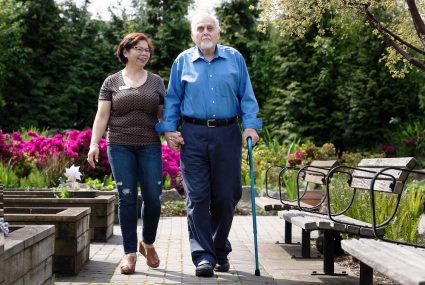Sundowner syndrome is a set of symptoms that are typically experienced by people with mid- to late-stage Alzheimer’s or other types of dementia. It is said to occur in up to 66% of older age patients with these conditions. It is also known as “late-day confusion.” Essentially, patients with sundowner syndrome often experience behavioral changes which tend to get worse in the late afternoon or evening.
What are the Symptoms of Sundowners Syndrome?
The symptoms associated with sundowners are similar to the behavioral changes seen in patients with dementia or Alzheimer’s, including:
- Fear
- Visual and auditory hallucinations and delusional thinking
- Pronounced mood swings and aggressive behavior
- Disorientation, pacing and wandering
- Anxiety and agitation
The difference with sundowners is that these symptoms will start to worsen and get more intense as the day goes on. It can sometimes last straight through the night, which can sometimes result in repeated waking through the night and wandering.
Diagnosing sundowners can be tricky, as there is no simple medical test to rely on. Rather, it is diagnosed based on the observance of repeated patterns of behavior. If you suspect that your loved one may have sundowners, it is a good idea to document the symptoms and behaviors you see. This will help doctors to spot patterns and make a diagnosis.
5 Ways to Ease Sundowners Syndrome
If your loved one experiences a worsening of symptoms at night, there are a few things you can do to help ease the symptoms and make your loved one more comfortable in the evening hours.
1. Stick to a schedule
It can be hard for patients with these symptoms to adjust to new routines and changes in everyday life. It’s common for them to react strongly (with anger, confusion, etc.) to any unfamiliar places, faces, or activities. You can make the evenings easier on them by ensuring you stick to a schedule. They will take comfort in familiar things and are less likely to get upset. If you find that you do need to make any changes to your daily routine, do so gradually. If you slowly ease them into changes, they will be better able to handle them.
2. Show them the light
Yes, we literally mean light. It’s common for people of all ages to experience low moods and irritability during the winter months when we don’t get much daylight. This is likely due to how the lack of light affects our circadian rhythms (sleep-wake cycles.) The same is true for those with sundowners. A study published in Psychiatric Investigation suggests the use of light therapy to treat patients with sundowners can improve symptoms. You can buy special lights just for light therapy – simply turn them on and have your loved one sit nearby during the day. It’s also great to get natural sunlight when you can; try to spend time outdoors or sit near a window.
3. Keep them active
We know that exercise does wonders for the body and the mind. By ensuring your loved one stays active during the day, they’re more likely to feel tired when it’s time to go to bed. This can make it easier for them to fall asleep and stay asleep through the night.
4. Keep your evenings calm and quiet
Try to structure your days so the bulk of your activities are done earlier. This allows your loved one time to slow down towards the end of your day. Keep evenings reserved for quiet activities like reading, listening to music, or any practicing any hobbies like drawing or painting. You’ll create a soothing, calm environment for them as the evening progresses.
5. Keep yourself calm
If your loved one does start to experience behavioral changes, how you react can play a big role in how the situation plays out. If they become angry or agitated, think of this formula and react accordingly: validate, reassure, and distract. First, acknowledge and validate their feelings to let them know you understand why they might feel that way. Next, provide some reassurance; let them know that you’re there for them and do anything you can to make them feel calm and safe. Once they are calmed down, distract them with something soothing, whether it’s showing them an object or starting an activity.
At Bria Communities, we are experienced in providing care for those with dementia, Alzheimer’s and sundowner syndrome. We understand that every resident has different care needs and work with residents and their families to ensure we provide the right level of support. We offer lots of activities during the day to keep residents busy, active, and entertained.
When your loved one requires extra support, we offer BriaCare™ at two of our communities; Magnolia Gardens in Langley and The Waterford in Tsawwassen. The goal of BriaCare™ is to keep our residents happy and healthy, which means including them in social events and recreational activities available to our residents in independent living.

Comments